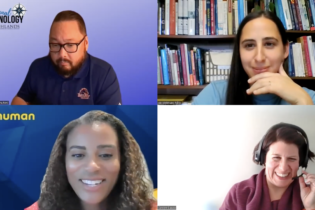$3 Million Federal Investment to Boost Digital Inclusion in Lemon Hill

Sacramento State University, Sacramento City College, Valley Vision, and partners will pilot a innovative digital navigator program in the Lemon Hill community of South Sacramento.
Valley Vision is very pleased to partner with California State University, Sacramento, through the Capital Region Coalition for Digital Inclusion (CRCDI), in bringing nearly $3 million in federal funding to our region from the National Telecommunications and Information Administration (NTIA). NTIA, through its new, highly competitive Connecting Minority Communities Pilot Program (CMC), is funding Historically Black Colleges and Universities, Hispanic Serving Institutions and others across the U.S. to address pervasive digital exclusion in minority communities. This major investment will support digital equity in our region through the creation of the Sacramento Regional Consortium for Digital Equity, a collaborative of Sacramento State, Valley Vision, Sacramento City College, Cosumnes River College, and community partners to connect underserved communities with vital digital inclusion resources.
The Collaborative, led by Sacramento State, will develop a Digital Navigator Intern (DNI) program to serve the Lemon Hill community in Sacramento County. Through this program, students will be trained as Digital Navigators and deployed to Community Anchor Institutions working in Lemon Hill. Digital navigators are trusted guides who assist community members in internet adoption and the use of computing devices. Digital navigation services include ongoing assistance with affordable internet access, device acquisition, acquisition of digital skills, and application support. Sacramento State will also establish a Community Engagement Lab that will have essential software and equipment, will be staffed by the DNIs, and provide access for community training or open lab time for both the DNIs and community members.
Through the work of the CRCDI, the Lemon Hill neighborhood in Sacramento had been identified by the Sacramento Employment and Training Agency (SETA) as a priority underserved area based on demographic and economic indicators. This area has the highest poverty rate among communities in Sacramento County with populations of 10,000 or more, and became a focus for this grant. We are invigorated to take the efforts made by the CRCDI to the next level, working with Sacramento State, Los Rios and our community partners to bring digital navigators to our region. Dr. Robert S. Nelsen, President of Sacramento State, commented on this groundbreaking initiative:
“Sacramento State is thrilled that the NTIA saw the value in our proposal to help close the Digital Divide in Lemon Hill. As an Anchor University, we look forward to working with our partners, including Sacramento City College, the Greater Sacramento Urban League, La Familia Counseling Center, United Way, and Valley Vision to promote digital inclusion and improve broadband access. Our work will provide more families with access to broadband and a computer, increase educational attainment, and grow the neighborhood’s economy.” – Dr. Robert S. Nelsen
The project will launch in 2023. Digital navigators are essential to closing the Digital Divide, and we look forward to working with this team of digital inclusion trailblazers to establish transformational and lasting digital equity impacts in our community. With this pilot, led by Dr. Yvonne Harris at Sacramento State and a member of the CRCDI Steering Committee, we also have the opportunity to scale the CRCDI’s digital inclusion efforts, thanks to the support of NTIA. In addition, we thank the California Emerging Technology Fund which provided support in developing the application to NTIA, and is leading a Higher Education Collaborative for CMC grant recipients Sacramento State and Merced College and our evaluation partner, California State University, Chico. We also thank Congresswoman Doris Matsui for her valued ongoing support of our community’s digital inclusion efforts.
More information about this program can be found in press releases from NTIA and Rep. Matsui’s office.
###
About Valley Vision: For more than 25 years Valley Vision has used research to help governments, businesses, foundations and community groups better understand the issues facing our region. We believe that knowing and understanding the facts is the best way to establish a common working foundation for collaborative problem-solving. That’s why Valley Vision conducts, produces and interprets research including scientific public opinion polls, focus groups, community needs assessments, best practice studies and other research tools to bring to light the information local leaders need to improve our communities.





